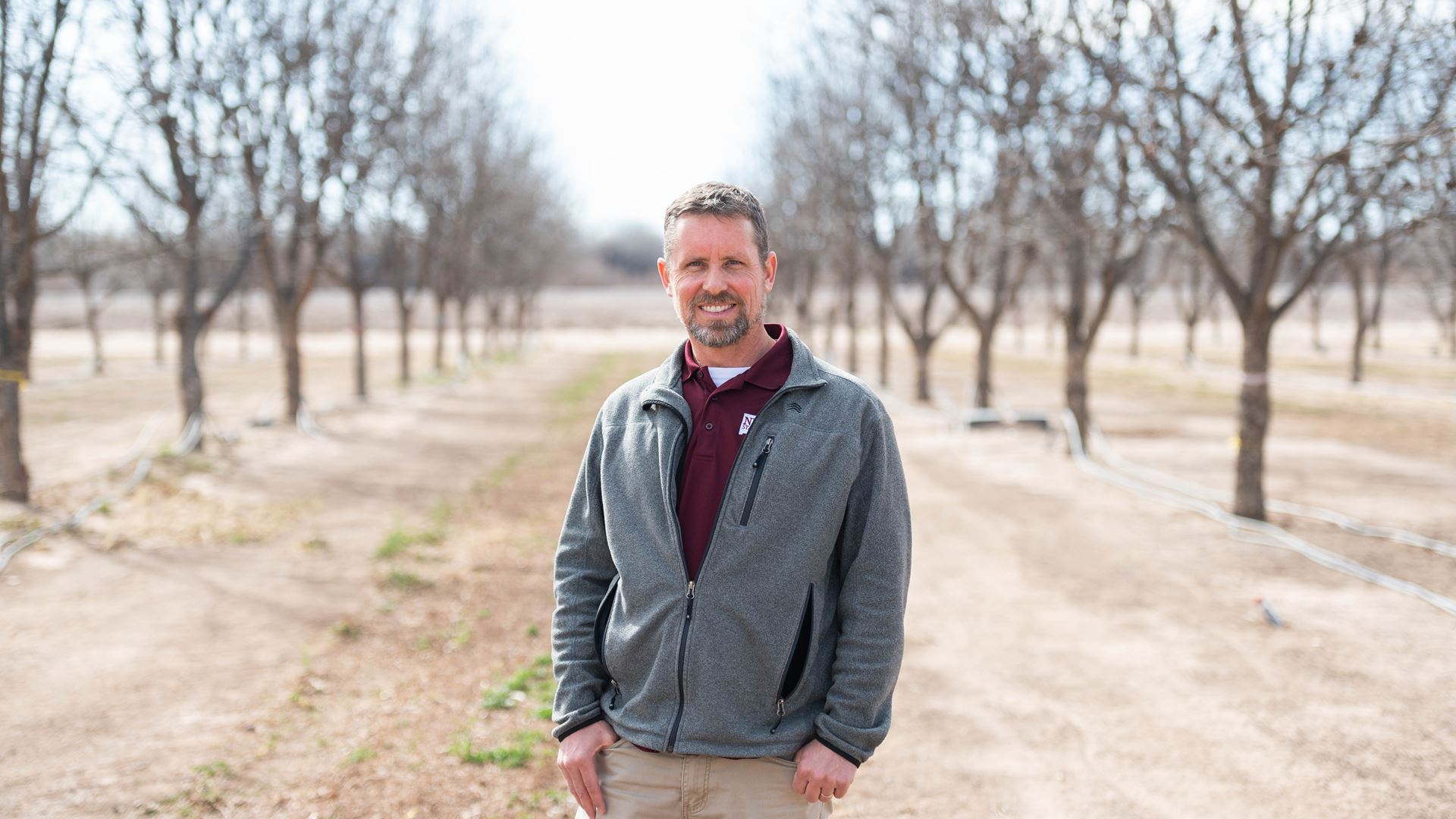Growing up in California’s Central Valley, Richard Heerema developed an interest in horticulture as a child. He gained an affinity for the region’s almonds, grapes, peaches, pistachios and walnuts. In 2005, Heerema joined the New Mexico State University College of Agricultural, Consumer and Environmental Sciences as an Extension pecan specialist.
“One thing that makes pecans stand out among all of the other major commercial tree fruit and nut crops grown in the Western United States today is that this is a crop that actually originates in North America,” he said. “All other major commercial tree fruit and nut crops were introduced here from the Old World.”
Heerema has spent the past 17 years at NMSU conducting research to combat drought, salinity, harsh soils and other environmental stresses so crops in New Mexico can continue to flourish.
“I hope my research and the Extension program accomplish exactly that for pecans,” he said.
He often shares his expertise and research with New Mexico residents and coordinates educational programs for the Western Pecan Growers Association’s annual conference. He also developed the Western Pecan Production Short Course, which helps pecan producers of varying experience levels.
One of Heerema’s main research topics is mineral nutrients. Deficiencies in nutrients can limit pecan trees’ performance in New Mexico because pecans aren’t able to absorb certain nutrients found in soils common throughout the southwestern U.S. He and his team have modeled the relationships between leaf tissue concentrations of these nutrients and leaf photosynthesis in pecans, which provided a better understanding of the minimum nutrient levels needed to maintain tree health.
Heerema also has studied irrigation and plant-water relations. A U.S. Department of Agriculture-funded project allowed him and his team to install a state-of-the-art pressurized irrigation system in a pecan orchard at NMSU’s Leyendecker Plant Science Research Center. Working with College of ACES faculty members Sam Fernald and Dave Dubois, Heerema conducted a study on deep percolation losses of irrigation water to develop better irrigation scheduling tools for pecan farmers.
Heerema also serves as a co-principal investigator in another USDA-funded project, “Trees for the Future.” College of ACES faculty member Jennifer Randall serves as the project’s director. In this project, researchers are working to better understand how pecan varieties differ in their water-use efficiency and susceptibility to physiological water stress. The project’s results may provide pecan farmers with new and better options when the water supply is low.
Heerema’s current projects revolve around the microbiome of pecan roots and rhizospheres. Since pecan roots lack root hairs that help mine soil for nutrients and water, populations of fungal and bacterial species on and around the roots may play critical roles in efficient root function.
Heerema and Randall are also part of a group of researchers analyzing how pecan root and rhizosphere microbiome diversity varies with soil characteristics in New Mexico. The team includes College of ACES faculty members Nicole Pietrasiak and Ciro Velasco-Cruz, graduate students McKenzie Stock and Paul Gabriel, and undergraduate student Lily Chavez. In this project funded by the New Mexico Department of Agriculture, the researchers are studying how farmers can utilize certain soil treatments to modify the pecan root and rhizosphere microbiome to increase tree health and performance.
A version of this story was first published in the spring 2023 issue of ACES Magazine. To read the issue, visit https://nmsu.news/ACES-Mag-Spring-2023.
-30-
Written by Nicole E. Drake and Tiffany Acosta
CUTLINE: Richard Heerema joined the New Mexico State University College of Agricultural, Consumer and Environmental Sciences in 2005 as an Extension pecan specialist. Heerema conducts research to combat drought, salinity, harsh soils and other environmental stresses so New Mexico crops, like pecans, can continue to flourish. (NMSU photo by Josh Bachman)

